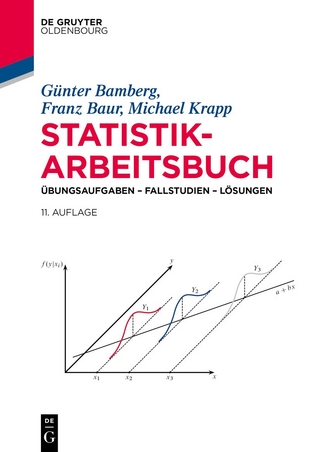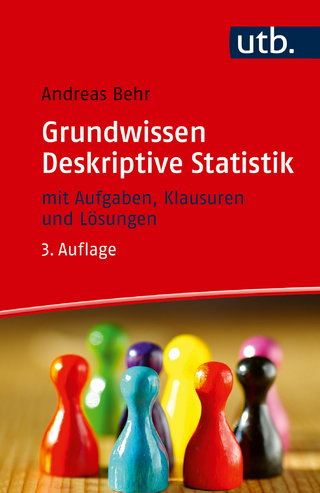
Panel Data Econometrics
Common Factor Analysis for Empirical Researchers
Seiten
2019
Routledge (Verlag)
978-1-138-38967-0 (ISBN)
Routledge (Verlag)
978-1-138-38967-0 (ISBN)
In the last 20 years, econometric theory on panel data has developed rapidly, particularly for analyzing common behaviors among individuals over time. Meanwhile the statistical methods employed by researchers have not kept up-to-date. This book attempts to fill this gap, teaching researchers how to use the latest panel estimation methods correctly.
In the last 20 years, econometric theory on panel data has developed rapidly, particularly for analyzing common behaviors among individuals over time. Meanwhile, the statistical methods employed by applied researchers have not kept up-to-date. This book attempts to fill in this gap by teaching researchers how to use the latest panel estimation methods correctly.
Almost all applied economics articles use panel data or panel regressions. However, many empirical results from typical panel data analyses are not correctly executed. This book aims to help applied researchers to run panel regressions correctly and avoid common mistakes. The book explains how to model cross-sectional dependence, how to estimate a few key common variables, and how to identify them. It also provides guidance on how to separate out the long-run relationship and common dynamic and idiosyncratic dynamic relationships from a set of panel data.
Aimed at applied researchers who want to learn about panel data econometrics by running statistical software, this book provides clear guidance and is supported by a full range of online teaching and learning materials. It includes practice sections on MATLAB, STATA, and GAUSS throughout, along with short and simple econometric theories on basic panel regressions for those who are unfamiliar with econometric theory on traditional panel regressions.
In the last 20 years, econometric theory on panel data has developed rapidly, particularly for analyzing common behaviors among individuals over time. Meanwhile, the statistical methods employed by applied researchers have not kept up-to-date. This book attempts to fill in this gap by teaching researchers how to use the latest panel estimation methods correctly.
Almost all applied economics articles use panel data or panel regressions. However, many empirical results from typical panel data analyses are not correctly executed. This book aims to help applied researchers to run panel regressions correctly and avoid common mistakes. The book explains how to model cross-sectional dependence, how to estimate a few key common variables, and how to identify them. It also provides guidance on how to separate out the long-run relationship and common dynamic and idiosyncratic dynamic relationships from a set of panel data.
Aimed at applied researchers who want to learn about panel data econometrics by running statistical software, this book provides clear guidance and is supported by a full range of online teaching and learning materials. It includes practice sections on MATLAB, STATA, and GAUSS throughout, along with short and simple econometric theories on basic panel regressions for those who are unfamiliar with econometric theory on traditional panel regressions.
Donggyu Sul is currently the John Kain Professor of Economics at the University of Texas at Dallas, USA. He specializes in panel data econometrics, international finance, and empirical economic growth, and his articles have been published in numerous major research journals.
Preface. 1 Basic Structure of Panel Data. 2 Statistical Models for Cross Sectional Dependence. 3 Factor Number Identification. 4 Decomposition of Panel: Estimation of Common and Idiosyncratic. 5 Identification of Common Factors. 6 Static and Dynamic Relationships. 7 Convergence. 8 Appendix: Basic Panel Regressions.
References. Index
| Erscheinungsdatum | 26.02.2019 |
|---|---|
| Zusatzinfo | 20 Tables, black and white; 28 Line drawings, black and white; 28 Illustrations, black and white |
| Verlagsort | London |
| Sprache | englisch |
| Maße | 156 x 234 mm |
| Gewicht | 235 g |
| Themenwelt | Wirtschaft ► Volkswirtschaftslehre ► Ökonometrie |
| ISBN-10 | 1-138-38967-6 / 1138389676 |
| ISBN-13 | 978-1-138-38967-0 / 9781138389670 |
| Zustand | Neuware |
| Haben Sie eine Frage zum Produkt? |
Mehr entdecken
aus dem Bereich
aus dem Bereich
Übungsaufgaben – Fallstudien – Lösungen
Buch | Softcover (2022)
De Gruyter Oldenbourg (Verlag)
24,95 €
mit Aufgaben, Klausuren und Lösungen
Buch | Softcover (2023)
UTB (Verlag)
24,90 €
Set aus Lehr- und Arbeitsbuch
Buch | Softcover (2022)
De Gruyter Oldenbourg (Verlag)
35,95 €


